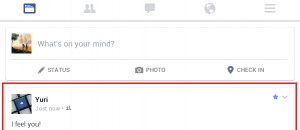On March 6, 2012 six British soldiers were killed in the Lashkar Gah area of Afghanistan by an improvised explosive device (IED). Two days after this incident Azhar Ahmed — a 19 year old from West Yorkshire — posted the message “all soldiers should die and go to hell” on Facebook. It isn’t entirely clear if Ahmed posted the message in relation to the recent death of six British soldiers or if it was a general anti-war sentiment. In any case, the message offended quite a few people on and off Facebook, especially those who had loved ones serving in armed forces. In fact, the message was deemed so offensive that Ahmed was later charged and tried in Huddersfield Magistrates Court for “sending a grossly offensive communication”.
Update: The British police are saying Ahmed was charged for a “racially aggravated public order offense”. Say what?!
In court, Ahmed admitted the message he posted was “unacceptable” but denied that it was “grossly offensive”. District Judge Jane Goodwin disagreed saying Ahmed’s message was “derogatory, disrespectful and inflammatory” and a jury convicted Ahmed of the charges levied against him. Sentencing for Ahmed will take place later this year; it isn’t entirely clear what his punishment will be.
According to Ahmed, his intention wasn’t to offend people or soldiers but rather to bring attention to the other deaths that are happening in Afghanistan. Ahmed also says he spent time apologizing to people after they posted replies to his comment and later realized “it was unacceptable for them to see something so upsetting and distressing, to write something like that”.
In that regard, I agree with one point. Ahmed’s message indeed was insensitive and irresponsible. While Ahmed may not have intended to offend people, he should have been more respectful of the feelings of others. Indeed most, if not all, of the soldiers in Afghanistan aren’t there by choice but rather by the choice of people on Downing Street. Being anti-war does not mean you need to wish harm on others.
That being said, however, does Ahmed’s message really constitute being taken to court? Should Ahmed have be tried for essentially hurting people’s feelings? As far as I can tell, Ahmed’s Facebook message did not trample on anyone’s rights, did not endanger anyone, and did not incite violence. Unless there are some facts I don’t know about, the way I see it Ahmed’s message is akin to a kid voicing his frustration, albeit in an irresponsible manner. Isn’t this something that is protected under the concept of free speech?
I mean if Ken Gregory — a British politician — can direct an anti-gay message at another person and only be “cautioned” (not charged) over it and Meurig Llwyd Williams — editor of a British church magazine Y Llan — is forced to resign but not charged for reprinting clearly offensive anti-Islam cartoons, then what makes Azhar Ahmed’s message different? It is easy to play the race and religion card here but the underlying reason could also just be national pride. After all, soldiers do hold a special place in the hearts of many. Or it could be both — how dare a “moslem” insult “our” soldiers.
I really don’t know what spurred the English justice system to charge a kid over a foolish Facebook comment. All I can ask is this: is free speech dead? Or, even worse, is free speech only for the blond haired and blue eyed? Shame on the prosecutor that charged this kid and shame on the judge and jury that allowed national pride (or whatever reason they ruled the way they did) to get in the way of a higher calling — justice. No one said justice is always fair but it shouldn’t be this unjust either.
[via BBC | Image via charlesfettinger]

 Email article
Email article




